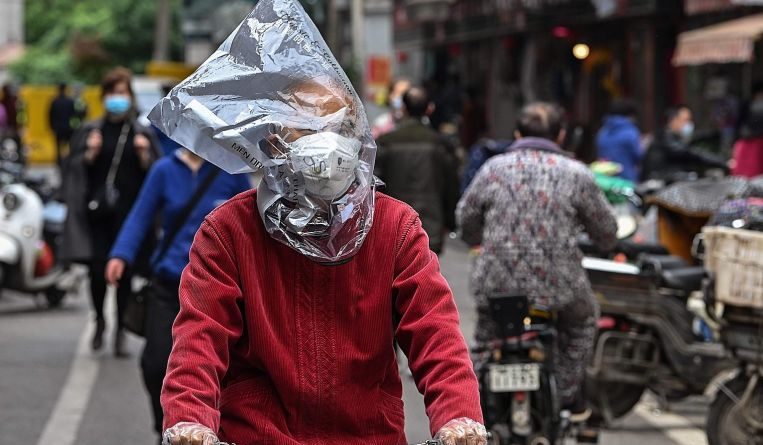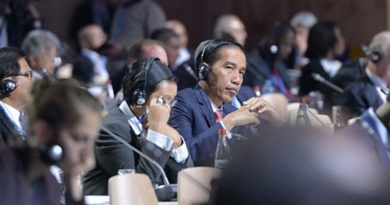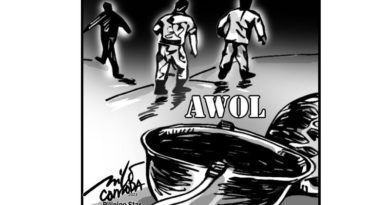COVID-19: “The 145 Days Pandemic”- WORLD & CHINA Epicenter – Trauma lingers as Wuhan reopens
It has been nearly a week since academic Han Lining was allowed to leave his studio apartment in Wuhan where he spent 76 days alone, but the assistant economics professor is still worried about going outside.
He tries to spend as little time outdoors as possible, taking along a stack of alcohol wipes and hand sanitiser, cleaning every surface before sitting down.
.
“At least I’m not wearing any gloves,” he said with nervous laughter close to his home in Wuchang, a stone’s throw from Wuhan University where he teaches.
The 30-year-old had fallen ill just before the city was put into lockdown on Jan 23, and did not want to go to his parents’ home in the Hankou district across the Yangtze River, about half an hour away.
“At the time, we weren’t sure how the virus was spreading and I realised I was near Huanan market too. So when I got a bad stomach and a mild sore throat, which they said was one of the symptoms, I decided to stay away from everyone,” he said.
Huanan Seafood Wholesale Market, where many of the early patients had worked or shopped at and where the virus was believed to have originated, has been shut since Jan 1.
.
Still, it was an agonising few weeks for Dr Han not knowing if he had been infected with the coronavirus, and living in an apartment “mostly meant for sleeping”. He does not even have a rice cooker or broadband Internet.
.
With everyone ordered to go under quarantine, he would spend his days lying in bed thinking about the sudden outbreak that had gripped his home city. “I think I was depressed,” he said quietly. “It was almost like when I was doing my PhD, when I felt completely alone and no one really cared about what I was researching.”
What little social interaction he had with his neighbourhood committee, which was helping to organise food deliveries, and his neighbours, who sometimes got his groceries, helped keep him sane.
“Everyone was angry and trying to assign blame,” he recalled. “Some targeted the management, some the government. For me, I looked towards my religion, which says to forgive, but it’s difficult,” said Dr Han, a Christian.
.
Many were unhappy with the local community management, he said, recounting an incident in which medical reinforcement teams were put up in apartments in his building where some units doubled as hotel rooms.
“Maybe it was a way for them to vent their anger, but the neighbours banded together to complain and had them remove the medical workers, who they thought were a risk to our health,” he said.

.
POST-TRAUMATIC STRESS DISORDER
The two-month lockdown may have just been lifted, and some semblance of normal life is returning to this city of 11 million. But anger, anguish and anxiety still linger.
“It might not come out now, but post-traumatic stress disorder (PTSD) is very real and could manifest in various ways in months or even years to come,” said counsellor Du Mingjun, who, together with her colleagues at Hubei Province Counsellors Association (HPCA), set up a wellness hotline as soon as the lockdown kicked in.
Initially staffed by just one counsellor catering to Hubei residents, the hotline quickly expanded to cover all of China with some 400 trained counsellors taking turns to man the phones.
But calls came from all over the world, including from overseas Chinese living in Canada, Italy and across South-east Asia.

.
.
“We saw a trend in the calls we received. In the early days, it was from people worried that they couldn’t get help, then it became people who were paranoid that they might have contracted the virus.
“By March, many of the calls were about domestic tensions because underlying family problems were getting exacerbated by the stressful situation,” said Ms Du, 49.
By the end of the two-month lockdown, the hotline had received 2,367 calls.
When the announcement came on March 25 that the lockdown would soon be lifted, it was the first time in eight weeks the hotline logged no calls at night.

.
.
Ms Du and her team are keeping the service going, and are now training counsellors to help those dealing with grief and trauma as Wuhan and the wider Hubei province begin to process their ordeal.
“After the outbreak, while we see more cars and people on the streets, the trauma of those 76 days, the spectre of that time, still remains and we need a long process of therapy,” said Mr Tang Guobin, vice-chairman of the HPCA.
“In the early days, we were dealing with an emergency. Now, it’s about the follow-up. There’s a lot of remaining trauma that would manifest over time, in all sorts of ways, so we need to be prepared for that.”

.
.
SOLACE IN MUSIC
While censors worked overtime to scrub social media clean of a torrent of rants in the early chaotic days of the outbreak, people sought solace elsewhere, like in the music of singer-songwriter Sean Feng, also known as Feng Xiang.
The former psychiatrist returned from Beijing to his home town of Wuhan in 2014 to be a musician and has been living in the city since.
Shortly after the lockdown, he found that his song, Hanyang Gate Garden, a wistful ode to the Hankou district released in 2016 and sung in the Wuhan dialect, was being shared widely across social media.
Thousands commented on microblogging site Weibo that the song made them weep as it reminded them of a simpler life in Wuhan before the coronavirus outbreak.
“This is a city that has been thoroughly traumatised,” said Mr Feng, 55, who wrote the song during a “difficult period” in his life.
“When you frame this as a war, it is that we’ve lost over 2,000 people, which sounds like a statistic when really what happened is that someone has lost a loved one, an already painful experience which has been repeated over 2,000 times across the city.”
.
The Sunday Times spoke to him on Tuesday, before the death toll in Wuhan was revised upwards on Friday, bringing the total number of fatalities to 3,869.
His music therapy sessions at a local hospital have been suspended because of the outbreak, but Mr Feng still organises occasional mini gigs online to offer people some comfort and cheer.
“Trauma is something you cannot get rid of in the short term, but the Chinese mindset is to get things over and done with,” he said, predicting a “crest” in the need for mental healthcare in Wuhan as PTSD sets in.
“You cannot remove trauma. It’s about how someone learns to live with it. There will be many who will have to live with this for their entire lives.”

.
.
GETTING BACK TO BUSINESS
Shop owners like Wang Jing, 66, are anxious just to get on with salvaging her business.
Her Cantonese restaurant in downtown Wuhan has been shut for two months and was only recently given the green light to reopen.
Even so, hardly anyone is dining in at her two-storey eatery as gatherings are still prohibited; delivery orders have been slow too.
“People come here to eat because it’s a special occasion because, for these people, Cantonese food is not something you have every day,” she said. “With the economy looking so bad, people are also trying to spend less.”

.
.
Small and medium-sized retail businesses are the hardest hit in the city, and many may not survive for much longer.
A study done by researchers from the National University of Singapore (NUS) Business School and Xiamen University showed that consumption, which has accounted for over 40 per cent of China’s gross domestic product (GDP) in the past decade, nosedived in the 12 weeks since the outbreak started in January. The research was conducted using daily transaction data in 214 cities from late January.
The worst-performing city was, unsurprisingly, Wuhan.

.
.
Over 12 weeks till the middle of this month, spending fell by 70 per cent in Wuhan, especially at restaurants, entertainment outlets and retail shops. At the height of the epidemic in February, spending dipped by as much as 87 per cent.
“I think economic recovery will take a while. There are many variables in this equation,” said Associate Professor Qian Wenlan from NUS Business School, who co-authored the study.
“You can see clearly in the data. Once the government confirmed and reported instances of asymptomatic cases starting from April 1, consumption went down again after signs of recovery. When people see there is a real risk this infection can come back again, spending dips.”
.
As Wuhan was recording next to no daily infections late last month, health officials bowed to public pressure and decided to make available the number of symptom-free cases in its daily report.
Such cases continue to unnerve the Chinese public as they could still pass on the virus.
And the health authorities, especially in Wuhan, maintain a tight grip on anti-coronavirus measures such as social distancing rules.
Wuhan ranked eighth last year among the economies of Chinese cities, with a GDP of 1.62 trillion yuan (S$325.7 billion) and a growth rate of 7.4 per cent. Long an industrial city well known for its automotive industry, the central Chinese city has been nurturing high-value-added industries such as by hosting semiconductor suppliers and other tech companies.
Most carmakers in Wuhan have restarted production lines since last month, although also with strict virus-control measures.
Work at a joint venture plant between Japanese automaker Honda and Dongfeng Motor resumed on March 11, but workers have to have their temperatures taken and are misted with disinfectant twice before being allowed onto the factory floor. Break time is staggered and low stools for resting are set at least 1m apart.
.
.
Most of its 12,000 workers have been asked to work an additional 1½ hours on top of their usual eight-hour shifts, said assistant director of the final assembly plant Li Shiquan.
When The Sunday Times visited on April 8, a sign in the factory stated the goal for that day: 1,237 cars, a significant increase from the usual 1,060.
The China Passenger Car Association has said that nationwide sales for last month was down 40 per cent from last year. But it predicted that weekly sales will rebound to last year’s levels by the end of this month.

.
.
WUHAN PEOPLE HAVE CHANGED
When taxi driver Wu Jianjun, 38, got back behind the wheel two days after the lockdown was lifted, he had trouble remembering the roads of Wuhan.
He had been stranded in his home town of Xiaogan, 60km from Wuhan, since late January.
“Business has been slow too because people still can’t come out. I’m happy if I make 200 yuan a day now,” he said.
“You know, after this outbreak, you can sense the people of Wuhan have changed. It’s like they used to be more forceful, more blunt, more fiery. But now everyone is a bit more subdued.”
Elizabeth Law China Correspondent In Wuhan and Tan Dawn Wei China Bureau Chief In Beijing
.

All photographs, news, editorials, opinions, information, data, others have been taken from the Internet ..aseanews.net | [email protected] | Fo r comments, Email to : Al Bulario


 Two-month lockdown lifted but residents still learning to cope with anger, grief and anxiety
Two-month lockdown lifted but residents still learning to cope with anger, grief and anxiety









